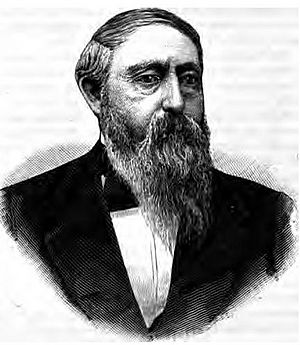George W. Webber (politician) facts for kids
Quick facts for kids
George Washington Webber
|
|
|---|---|

From 1882's Public Men of To-Day
|
|
| Member of the U.S. House of Representatives from Michigan's 5th district |
|
| In office March 4, 1881 – March 3, 1883 |
|
| Preceded by | John W. Stone |
| Succeeded by | Julius Houseman |
| Personal details | |
| Born | November 25, 1825 Newbury, Vermont, United States |
| Died | January 15, 1900 (aged 74) Ionia, Michigan, United States |
| Resting place | Highland Park Cemetery, Ionia, Michigan, United States |
| Political party | Republican |
George Washington Webber (November 25, 1825 – January 15, 1900) was an important politician and businessman from the U.S. state of Michigan. He served in the United States Congress and was also the mayor of Ionia, Michigan.
Contents
Early Life and Moving West
George Washington Webber was born on November 25, 1825, in Newbury, Vermont. When he was three years old, his family moved to Steuben County, New York. His father, Andrew Webber, was a farmer there.
George went to local schools and also attended an academy in Alfred, New York. He started his career working in the lumber business and as a general merchant. On July 18, 1850, he married Antoinette C. Abbey.
In 1852, Webber and his wife moved to Manistee County, Michigan. There, he continued to work in farming, lumber, manufacturing, and general store businesses. He was very active in politics. In the 1856 election, he helped promote the new Republican Party. He supported John C. Frémont for President. Because of his efforts, almost everyone in Manistee County voted Republican that year.
Business Ventures in Michigan
In 1858, Webber moved to Ionia County. He started a general store business with his brother, S. W. Webber, in Lyons. After five years, he sold his share to his brother.
George then moved to Ionia. He partnered with H. J. Wilson in a business called Webber & Wilson. At the same time, he also worked in the lumber business with Fred Hall. Their company was called Hall & Webber. Later, George's brother, A. J. Webber, bought out Fred Hall's share. The company then became Webber Brothers.
The Webber brothers also started a successful farm. They even founded a village on their land, which they named Mecosta. In 1870, George started a private bank in Muir with his brother S. W. Webber. He sold his share of this bank after four years.
George Webber was a key person in starting the Second National Bank of Ionia. He first served as the bank's vice-president. Later, he became the president, a position he held until he passed away.
Public Service in Ionia
George Webber was a village trustee in Ionia when it became a city. He helped write the city's official rules. He was elected mayor of Ionia twice, serving in 1874 and 1875.
During his time as mayor, a bridge was built over the Grand River. Webber also invested in building important structures in Ionia. In 1879, he built the Webber Block for $15,000. In 1880, he built the Webber brownstone block for $30,000. He set aside rooms in the brownstone block for the Ladies Library Association. He let them use these rooms for free as long as he or his wife were alive. He also owned most of the Second National Bank Block.
Serving in Congress
George W. Webber was elected as a Republican to the 47th United States Congress. He represented Michigan's 5th congressional district. He served in Congress from March 4, 1881, to March 3, 1883. He decided not to run for re-election in 1882.
Later Life and Legacy
After his time in Congress, George W. Webber went back to his business activities. He also continued to be involved in politics. He was a delegate from Michigan to the Republican National Convention in 1884.
His first wife, Antoinette, passed away on April 11, 1890. He married Miss E. Gertrude Brown of Boston on November 2, 1890. George W. Webber died in Ionia on January 15, 1900. He is buried in Highland Park Cemetery in Ionia.

